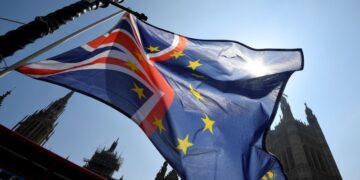The UK is preparing to make the biggest readjustment to its relationship with the European Union since Brexit. This aims to strengthen cooperation on trade and defense in order to revive the British economy and reinforce security on the continent.
Prime Minister Keir Starmer, who supported remaining in the EU in 2016, wants to demonstrate that this revival is of real benefit to the British people. This is a way of defusing accusations of “Brexit betrayal,” particularly from Nigel Farage, leader of Reform UK. In London, Starmer is set to conclude a strengthened alignment agreement with the EU at a summit with Ursula von der Leyen and Antonio Costa.
The global context has changed since the UK’s effective exit in 2020. At the heart of this rapprochement is a defense and security pact that would give British companies access to a €150bn European rearmament program. This is a major issue for British manufacturers, who have been facing the constraints of leaving the common market for several years.
Negotiations throughout the weekend are said to have resulted in an agreement that will be finalized today.
Exports, Erasmus and simplified formalities
This warming of relations comes at a time of geopolitical instability, with Russia’s offensive in Ukraine and Donald Trump’s threats to the international order prompting capitals around the world to strengthen their strategic partnerships.
The United Kingdom recently signed a trade agreement with India and obtained tariff reductions from the United States. Meanwhile, the EU is accelerating its own negotiations with countries such as Canada, Japan, and Singapore.
London particularly hopes to reduce border controls and red tape that are hampering agri-food exports. Another measure that is expected is easier access for British citizens to electronic gates at European airports.
In return, the UK could agree to a youth mobility program and consider rejoining Erasmus+. France is also pushing for a long-term agreement on fishing, which remains a sensitive issue since Brexit.
A balancing act for Starmer
The 2016 referendum deeply divided the country on immigration, sovereignty and trade. Since then, five prime ministers have come and gone, and relations with Brussels have deteriorated.
While a majority of Britons now regret Brexit, few want to return to the EU. Nigel Farage remains popular, which limits Starmer’s leeway.
However, the Prime Minister has managed to establish a strong relationship with Emmanuel Macron – particularly on Ukraine. Having not been involved in the political battles surrounding Brexit, Starmer enjoys a more favorable position vis-à-vis Brussels.
Mutual efforts that could bear fruit
The agreement remains constrained by Starmer’s commitment not to rejoin the single market or the customs union. However, he is seeking enhanced access to certain sectors, despite the EU’s reluctance to allow “cherry picking” without concessions in return.
To ease food trade rules, London will have to accept some alignment with European standards. Starmer intends to present this as a useful compromise to bring prices down.
The fishing issue promises tensions with Farage, while the Conservative opposition is already calling the meeting a “surrender summit”.
A former trade adviser on both sides of the Channel believes that the “taboo” of regulatory alignment must be broken, for the benefit of farmers and SMEs.
According to analysts, the defense component balances the agreement and strengthens its legitimacy. As Allie Renison, former head of trade at the British government, sums it up: “When the disruptions are so visible, any reduction in friction with your main partner is a step in the right direction.”















